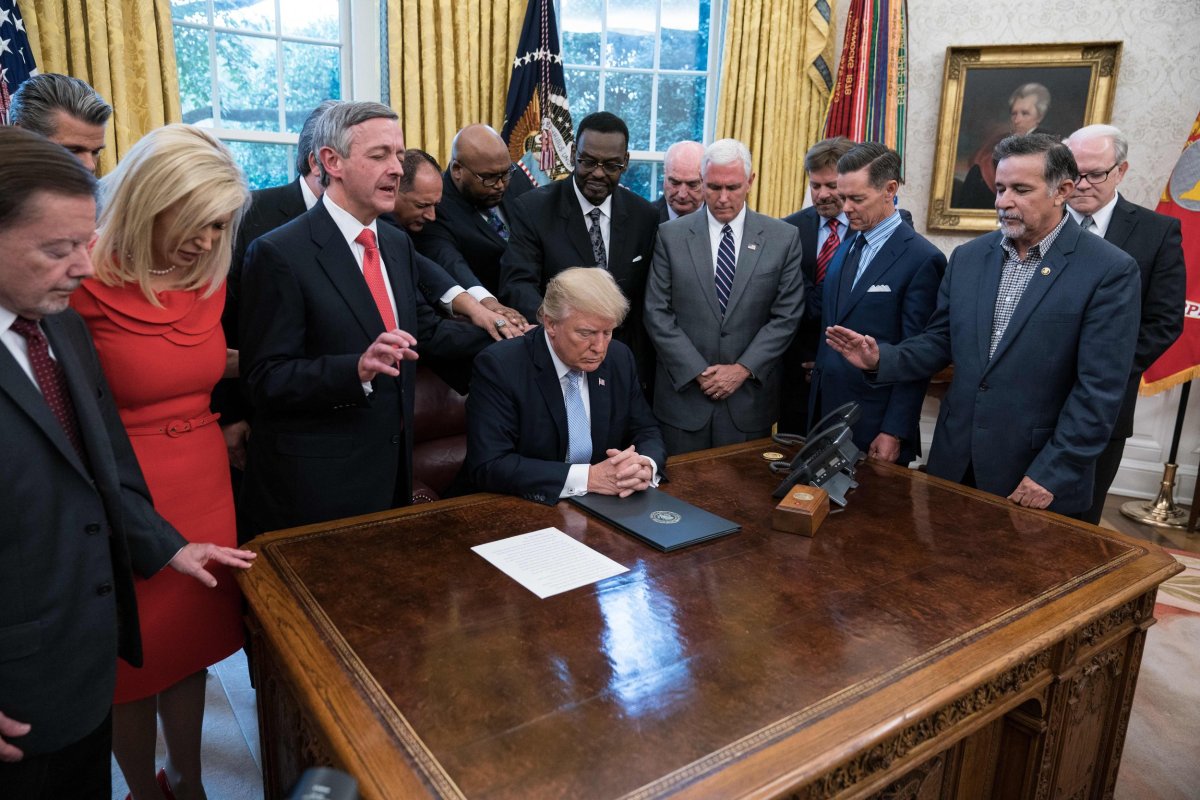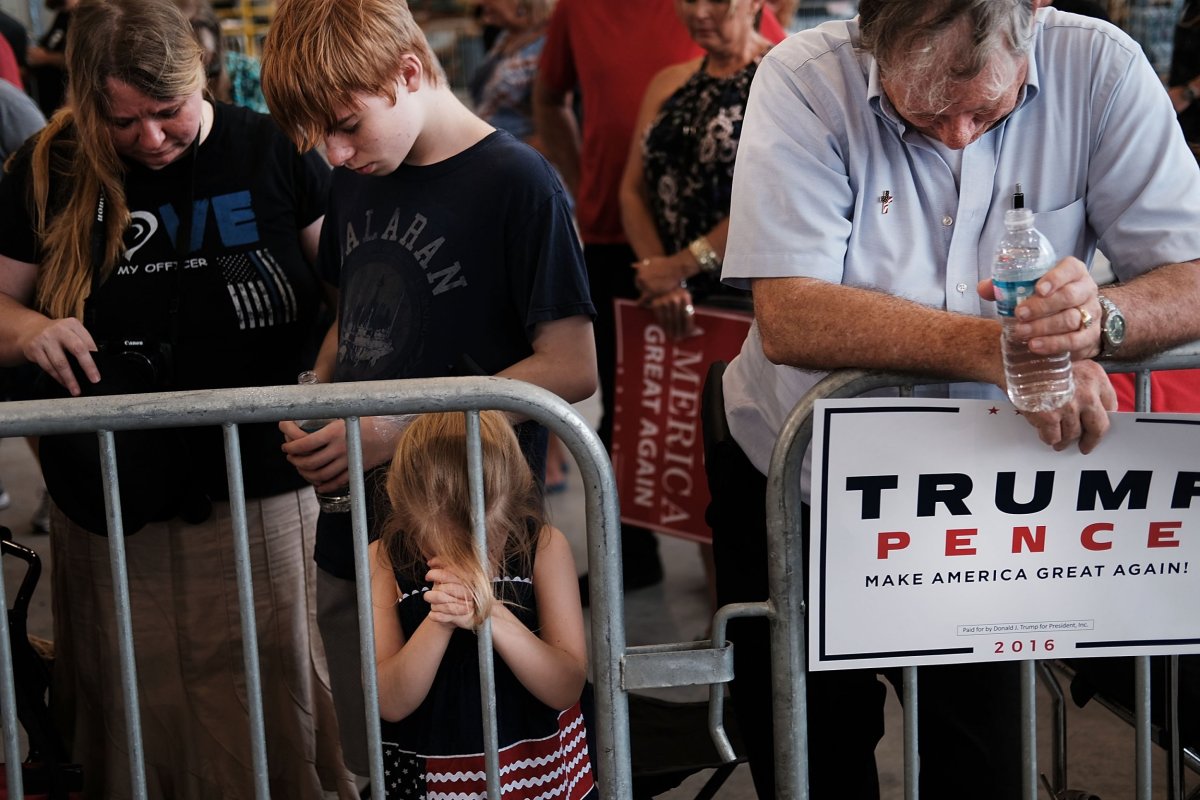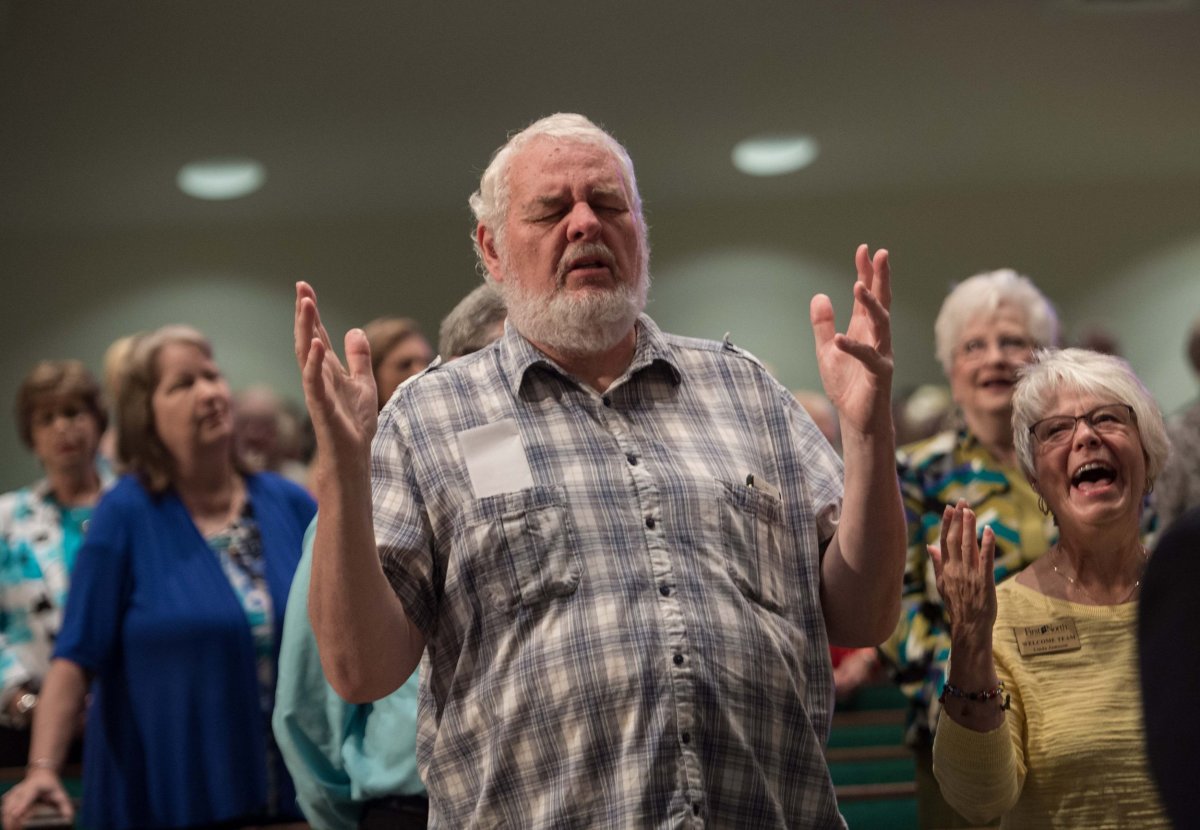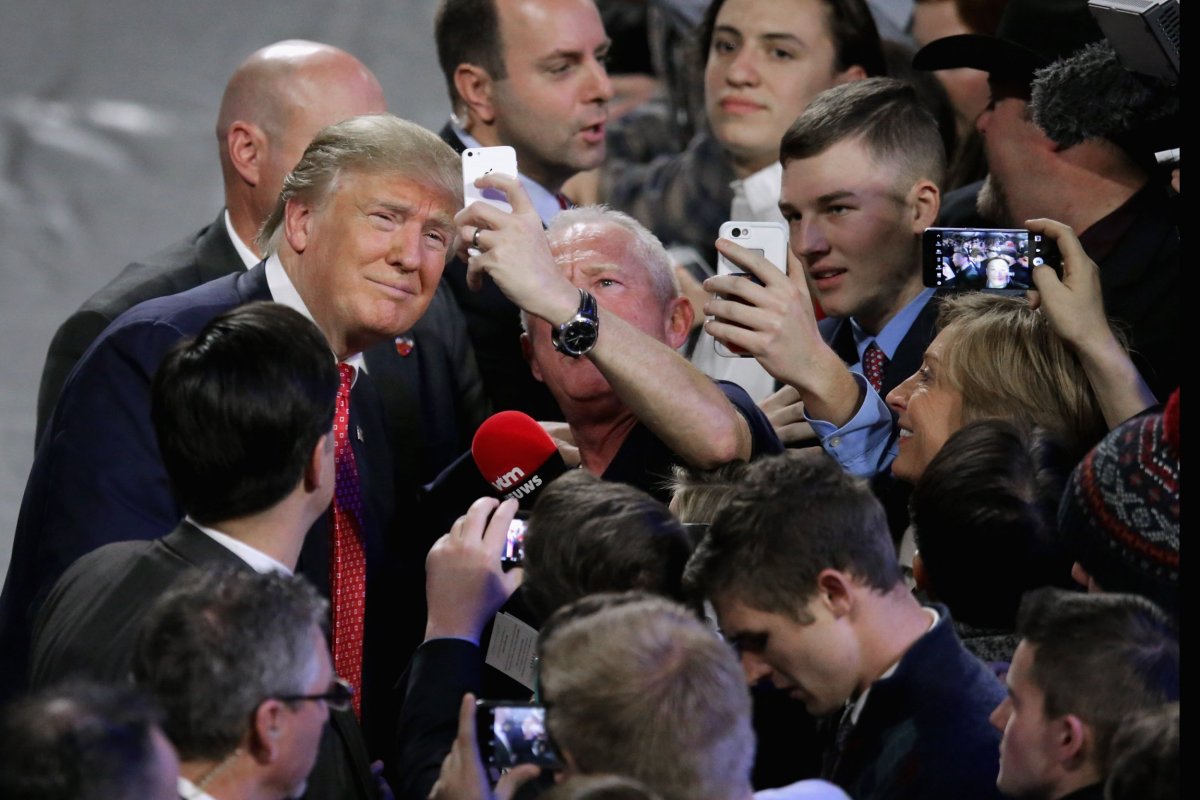Alex Camire had left the church a few months before his pastor announced from the pulpit that the election of Donald Trump was "a miracle of the Lord."
The 29-year-old Connecticut social worker had been raised in the evangelical church; his parents were married in it. But Camire's faith had started to fail a decade earlier, when his church deemed his mother's alcoholism—and his parents' subsequent divorce—a "sin" instead of an addiction. And a secular college education taught him, he said, that "The World"—the secular community outside the church—wasn't going to drag him into a cesspool of sex and drugs, as he'd been taught from childhood. But his pastor's outspoken support of Trump convinced him he'd made the right decision.
Like Camire, Californian Jason Desautels was raised in an evangelical church. He began to doubt his faith as a teenager, when, in the week after the Oklahoma bombing, his church's minister railed against "sand people" and Muslims. "When it came out that the bomber was a white nationalist, he didn't apologize or even say anything," Desautels recalled. "And the adults seemed to be all fine with that. That planted the seed."
Later, as an Army infantryman in Iraq, serving in Ramadi and Fallujah, Desautels, now 39, moved further away from the teachings of his evangelical faith. "I was in the land of Father Abraham. I had this weird spiritual moment when I realized that these families had lived in this neighborhood for longer than America had been a nation, and here we were telling them what to do." He cut ties with his church after his sister came out as gay and felt she had to apologize to their parents. Now his relationship with his parents is strained; they don't discuss politics (his parents support Trump) or religion.
Blake Chastain, 35, was raised in an Indiana evangelical church community and entered an evangelical college, Indiana Wesleyan, the week of 9/11. He had been planning to go to the seminary. Instead, he began to fall away from the church when he couldn't reconcile what he was learning in a class studying the Greek Bible with his history professor's support for the Iraq War. "In college I became aware of how conservative Christianity was at odds with the teachings in the Bible." He left and became involved in the "ex-vangelical" movement, writing and producing his own podcast, and has become a networker for other evangelicals who can't reconcile anti-Muslim sentiment or migrant family separations with the teachings of their faith.
DeSautels, Chastain and Camire are white, straight men, a demographic that lifted Trump to victory in 2016 and that has formed a stalwart support base for the Republican Party since the 1970s. In the 2018 midterms, exit polls show, white evangelicals backed Republicans by 75 to 22 percent, while the rest of the voting population favored Democrats 66 to 32 percent. But they were less likely to vote for House Republicans in 2018 than they were to vote for Trump in 2016—which may have contributed to the Democrats' midterm pickup of House seats—and support for Trump has actually declined more among white evangelical men than women. The 11-point gender gap between evangelical men and women from 2016 shrank to six in the midterms, according to NBC's exit polls.

That reported small drop in white male evangelical support might be confirmation of political scientists' prediction that the evangelical-Republican alliance is cracking. DeSautels, Chastain and Camire belong to a cohort of younger white evangelicals who have been fleeing the church in such numbers that demographers predict evangelicals will likely cease to be a major political force in presidential elections by 2024.
The numbers are stark. Twenty years ago, just 46 percent of white evangelical Protestants were older than 50; now, 62 percent are above 50. The median age of white evangelicals is 55. Only 10 percent of Americans under 30 years of age identify as white evangelicals.
To be sure, evangelical Christians have been rewarded for their support of Trump after enduring eight years wandering in Obama's political desert. They have two new conservative Supreme Court Justices and the appointment of nine self-professed evangelical Cabinet members, plus a flurry of laws and executive orders clamping down on gender roles, abortion and LGBTQ rights. But experts say this may represent the last bounty for a waning political power. Unlike their parents, the younger generation is not animated by the culture wars; many are pushing for social justice for migrants and LGBTQ people and campaigning against mass incarceration—positions more in line with the Democratic Party.
The result is a shrinking conservative bloc, something that could weaken white Christian political power—and, consequently, a Republican Party that has staked its future on its alliance with the religious right. It's a conundrum that the father of modern GOP conservatism, Barry Goldwater, predicted in 1964: "Mark my word, if and when these preachers get control of the party, and they're sure trying to do so, it's going to be a terrible damn problem."

The End of the Alliance?
The alliance between the religious right and Republican Party dates back to the era of Brown v. The Board of Education, when white Southerners began to flee public schools after forced desegregation. They opened so-called "segregation academies": religious schools that were tax-exempt. When the IRS came after evangelical colleges like Bob Jones, which officially prohibited interracial dating, the schools were faced with losing their tax-exempt status.
That would have meant financial doom. But a Republican political genius named Paul Weyrich—with patronage from Western segregationist beer billionaire Joseph Coors—forged alliances with Southern religious leaders and weakened the IRS rule. Weyrich connected with pastor Jerry Falwell, and the moral majority was born. In the 1980 presidential election, the moral majority helped put Ronald Reagan into the White House. Over the next few years, abortion and gay marriage became the chief issues Republican strategists used to cement the alliance and drive right-leaning Christians into the voting booth.
The relationship between the GOP and the religious right remained strong, but the birth rate did not: The numbers of white Christians as a percentage of the population has dropped dramatically in the past quarter-century. Researcher Robert Jones, author of The End of White Christian America, has tracked what he calls a "stair-steps downward trajectory of white Christian presence in the electorate." In 1992, when Bill Clinton was elected, 73 percent of the electorate was white and Christian. By 2012, that number was 53 percent. "If current trends hold steady, 2024 will be a watershed year—the first American election in which white Christian voters do not constitute a majority of voters," Jones, who heads the Public Religion Research Institute (PRRI), told Newsweek.
Political scientists have been reporting the imminent death of the evangelical-Republican partnership for a decade. The connection, however, has stumped the pundit class each cycle. A poll earlier this year found that 77 percent of evangelicals—in all voting age groups—preferred the generic Republican candidate, compared with just 40 percent of the general voting population. In the past, pollster Jones said, evangelical voter turnout swamped low midterm turnout among minority and young voters, who tend to favor Democrats.That pattern was broken this year, as almost 30 million more Americans voted in the 2018 midterms than voted in the 2014 midterms.
Powerful white evangelical political organizers had worked hard, as usual, to mobilize their cohort. Earlier this year, Ralph Reed's Faith & Freedom Coalition announced it would spend $18 million to micro-target 125 million conservative voters before the midterms. Other faith groups engaged in a get-out-the-vote drive across the country. An organization associated with former Arkansas Governor (and Baptist preacher) Mike Huckabee, called My Faith Votes, spent $3.5 million aimed at getting evangelicals to the midterm polls, and threw in a Facebook Live session with Duck Dynasty's Phil Robertson for good measure. Colorado-based James Dobson's Family Institute ran a national "Pray. Engage. Vote." initiative in the lead-up to the midterms. Such is the influence of the religious right that Reed warned that if conservative jurist Brett Kavanaugh was not confirmed to the Supreme Court, evangelical voters would stay home on Election Day. Trump doubled down on his support for Kavanaugh.
An indicator of the fervor Trump inspired in many white evangelicals was evident on a billboard on I-70 near St. Louis, which appeared to compare the president to Jesus himself. The advertisement featured a picture of Trump above the words of John 1:14: "The Word became Flesh." Online critics pointed out that the full passage reads: "The Word became flesh and made his dwelling among us. We have seen his glory, the glory of the one and only Son, who came from the Father, full of grace and truth." The "Make the Gospel Great Again" organization that paid for the ad denied that it was equating Trump with the Messiah, but the owner of the billboard removed the ad the day before the election.
From a friend -- a billboard spotted outside of St Louis. I don't like using the word "heresy," but I think I'll make an exception in this case. pic.twitter.com/FqaPnBXGHT
— Diana Butler Bass (@dianabutlerbass) November 4, 2018
Evangelicals turned out in such numbers that they made up 26 percent of voters in 2016. They have been over-represented in terms of their actual demographic status in national elections since George W. Bush's win in 2000, Jones said.
But pollsters and political scientists point to some basic math that suggests a precarious future for the politically engaged faithful. According to Jones, white evangelicals constituted 21 percent of the American population when Barack Obama was elected in 2008; had dropped to 17 percent by 2016; and are at 15 percent now.
Jones has used the analogy of Elizabeth Kubler-Ross's landmark identification of "stages" of grief among the dying and their loved ones to describe what's happening to evangelicals and American politics. First comes denial, then anger, followed by bargaining, depression and acceptance.
"We are past denial. People see the writing on the wall in terms of demographic change. And that is also why we see immigration taking over and becoming the flagship issue. That and a wall symbolize the resistance to this demographic change," Jones said. "I think we are somewhere between anger and bargaining. And in many ways this shotgun marriage between Trump and white evangelicals happened under some duress and is a desperate bargain that you make at the end of life. That is what we're really seeing here."

Losing the Young
The last year white Protestants as a whole (including so-called mainline Protestants like Methodists, Presbyterians and Episcopalians) were a majority in America was 1993. "We crossed that milestone a long time ago," Jones said. "Prior to ten years ago, white evangelicals were the exception to that overall decline. They were holding steady, but in last 10 years white evangelicals have joined other white Christians in decline."
A lot of the reason for the decline is disaffected young people. "The median age of white evangelicals keeps ticking up," he said. "The only way that happens is youth attrition." Jones relies on the results of an annual, wide-ranging, 80,000-interview American Values Atlas poll for his research. In the most recent poll in 2017, 40 percent of individuals under 30 claimed "no religious affiliation" (sometimes called "the nones"). "White evangelicals are a big part of that decline," Jones said
In PRRI's research, survey respondents cite not believing in the doctrines and, surprisingly, politics. "They cite partisanship," Jones said. "That's a big turnoff for young people. And negative treatment of gay and lesbian people, that's been a big turnoff for younger Americans."
Polls find that upwards of 80 percent of young people now support same-sex marriage. That number includes young Republicans and evangelicals under 30. "Even people like me, a white male with a lot of societal privilege, can see that evangelical leaders are completely happy to join forces with white nationalist politicians and leaders and to give them the benefit of the doubt while they are attacking marginalized communities," ex-vangelical Blake Chastain said. "And that's just blatantly hypocritical."
Chastain said he and other former evangelicals in his social networks and who participate in his podcast are also turned off by the Trump alliance. "The fact is that evangelical leaders like Robert Jeffress [a Dallas megachurch leader and Trump supporter] and Jerry Falwell Jr. are blatantly power-hungry and willing to make these alliances, providing a theology that supports white nationalism."
I’ve often said that #Exvangelical is a repudiation of evangelicalism. I’ve always thought that carried an implied meaning that is worth making explicit now: #Exvangelical is also an affirmation of the things evangelicalism condemns.
— Blake Chastain (@brchastain) June 19, 2018
Evangelical leaders and thinkers, not surprisingly, reject this assessment.
Ed Stetzer, a political scientist and pastor based at Illinois's Wheaton College, knows all about the predictions of researchers like Jones, and he is aware of the polled views of young people. But he sees evangelical youth attrition as a kind of demographic sowing of wild oats, in which the young are predictably disaffected—but only temporarily. He is sure they will return to the fold. His name for the phenomenon is "generational cohort replacement." Stetzer thinks the young who move away from the faith essentially replace themselves in the church as an older, and more likely to vote, category. "The18 to 29 year olds are really secular now," he said. "But what we find is that people grow in their religiosity. So, the 60-year-olds of today are kind of as religious as the 60-year-olds in the 1970s."
Russell Moore, president of the Southern Baptist Convention, has faith in the future of evangelical youth as well. Moore did not vote for Donald Trump. He called the 2016 candidate a "Bronze Age warlord" for his behavior toward women, and Trump tweeted that Moore was "a nasty guy."
Moore is aware that American young people generally are more tolerant on sexuality and marriage, but he said, "in my wing of evangelicalism, there is virtually no difference between young and old" on those matters.
Church congregations are not graying, Moore said. He sees "really vibrant churches filled with young people exploding all over the country" and said he talks regularly with young people about the challenges of mingling faith with politics and secular life.
Moore said evangelical youth is different from its elders—but not so different that it won't return to the pews someday. "With Generation X, millennial and Generation Z evangelicals, there is a deep suspicion of any cynical use of religion for worldly purpose," Moore said. "So one has to motivate them differently than one would, say, the kind of television evangelist demographic that many secular people think of when they think of evangelicalism. When I am in a group of older evangelicals my message is typically 'Seek first the kingdom of God, political idolatry will kill us, let's remember what is transcendently important.' But when I talk to younger evangelicals, I am dealing with the opposite problem and saying one cannot simply withdraw from political life in overreaction to some dispiriting actions that have taken place."
Evangelical youth are not susceptible to the "Make America Great Again" slogan, Moore said, because they've never lived in an America in which their brand of fervent Christianity was ascendant.
"Young evangelicals do not feel as if they are losing anything in terms of American culture," he said. "They came of age at a time when following Christ seemed counter-cultural to them anyway. They never expected a nominally Christian culture in which being a church member would be the equivalent of being a good American."
Christopher Maloney, 32, was raised evangelical, stepped away from his faith, and has released a documentary film on the ex-vangelical movement, called In God We Trump. He disagrees with Moore that young evangelicals like him will ever come back to the fold.
"People around my age and younger were already deconstructing their evangelical faith in large numbers before Trump came along," he said. "What the 2016 election did was accelerate what was already happening. We had begun edging toward the doors and when evangelicals embraced Trump, we bolted outside. To be honest, I don't see a return of younger generations to the church as we know it. We're not interested in going to a central place once a week in order to consume religion, especially when we know that our fellow churchgoers are likely Trump supporters. Millennials largely live by Christian ethics without any formal doctrine or dogma. We just don't need a religious structure to tell us how to be kind to one other."

Meanwhile, the #MeToo movement has rocked churches as it has the rest of society, which may in part explain why, according to Pew Research Center polling, Trump's support among white evangelical women dropped from 73 percent to 67 percent between 2017 and 2018.
The disaffected ranks includes women like Dawne Marx, a 53-year-old Texas mother of five, who walked away from her church community in 2016 after decades of voting with the evangelical fold. "I was a single issue voter, a pro-life voter," she told Newsweek. "It was so nice and tidy. I didn't have to think about anything else," she said. "All of a sudden there is Trump and children wrapped up in aluminum blankets in cages and this crass, crude man on a daily basis, saying things like, 'OK, so a journalist got chopped up' and he's saying 'we have a $100 billion contract and there are a lot of jobs on the line.' It's like: they chopped somebody up!"
Marx, who used to be a registered Republican, spent the last month volunteering on phone banks for Texas Senate candidate Beto O'Rourke, the Democratic challenger who lost to Republican Ted Cruz, an evangelical pastor's son.
Blake Chastain has encountered hundreds of angry young evangelical women through his social network and podcast. "Women do not need to tolerate the sort of abuse they face when they remain in the evangelical communities," he said.
Moore voiced a similar view. "Many churches assumed sexual assault and sexual abuse were happening in other places but would never happen in the safe spaces of the church, and that simply is not true," he said. "One of the things we have seen over the past year is an amplified voice for evangelical women and girls who have survived sexual abuse and assault and that has been a welcome development in evangelical church life."
Because they are dealing with a shrinking population, Republicans have settled on a strategy of institutional changes like gerrymandering, voter suppression tactics and Supreme court rulings to shore up their minority status, Paul Djupe told Newsweek. Djupe and fellow political scientist Ryan L. Claassen have just published a book of scholarly articles titled "The Evangelical Crackup? The Future of the Evangelical-Republican Coalition."
Republicans also need to keep evangelicals voting at higher rates than the rest of the population, he said.
To maintain evangelical voter enthusiasm, Republicans are doing two things, Djupe said. "One is to reinforce their identity as Republicans by emphasizing the threat that traditionally Democratic groups present to them. This serves to insulate them from other sources of information, so they dismiss out of hand what the mainstream media says and what Democrats say because it is a challenge to their identity. And two, they have to really mobilize that sense of fear and threat because that gets them to the polls."
But running on "fear and threat," while appealing to the white base, has repercussions that can cost the religious right at the polls by alienating the one demographic with which they might find common ground—Hispanics.
Evangelicals had managed to hold their own within the general decline of mainstream Protestantism in the United States. But over the last 10 years, for the first time, some denominations at the heart of evangelicalism are not growing. The Southern Baptist Convention began to decline after more than 200 years of growth, losing a million members since its peak membership of 16.3 million in 2003—numbers that are countered only by an increase in its Hispanic membership.
That means that Trump's and the GOP's focus on immigrants and on politicizing the U.S. southern border could hurt the party's efforts to shore up its evangelical base. If the evangelical-GOP alliance is to continue, Djupe and Claassen contend, Republicans will have to embrace the only section of the evangelical population that is actually growing: the one that speaks Spanish.
"If Republicans decided they needed to grow their base, the obvious base would be to go to socially conservative Latinos," Djupe said. "That will mean some compromises on other issues like the size of government and safety net that Republicans won't go along with. So, with a shrinking and increasingly fragile coalition, they have to stoke the fear."
The generational transformation of evangelicals' views may ultimately have a greater impact on American politics than the changes in their numbers. "Often, secular people think of evangelicals in almost entirely political terms, as if evangelicals were cicadas who lie dormant between elections—which is not the case," said the Southern Baptist Convention's Moore. "You have stark differences between baby boomer and millennial evangelicals when it comes to the issue of political engagement."
Correction: An earlier version of this article mispelled the name of Robert Jeffress.
Uncommon Knowledge
Newsweek is committed to challenging conventional wisdom and finding connections in the search for common ground.
Newsweek is committed to challenging conventional wisdom and finding connections in the search for common ground.
About the writer
Nina Burleigh is Newsweek's National Politics Correspondent. She is an award-winning journalist and the author of six books. Her last ... Read more
To read how Newsweek uses AI as a newsroom tool, Click here.








